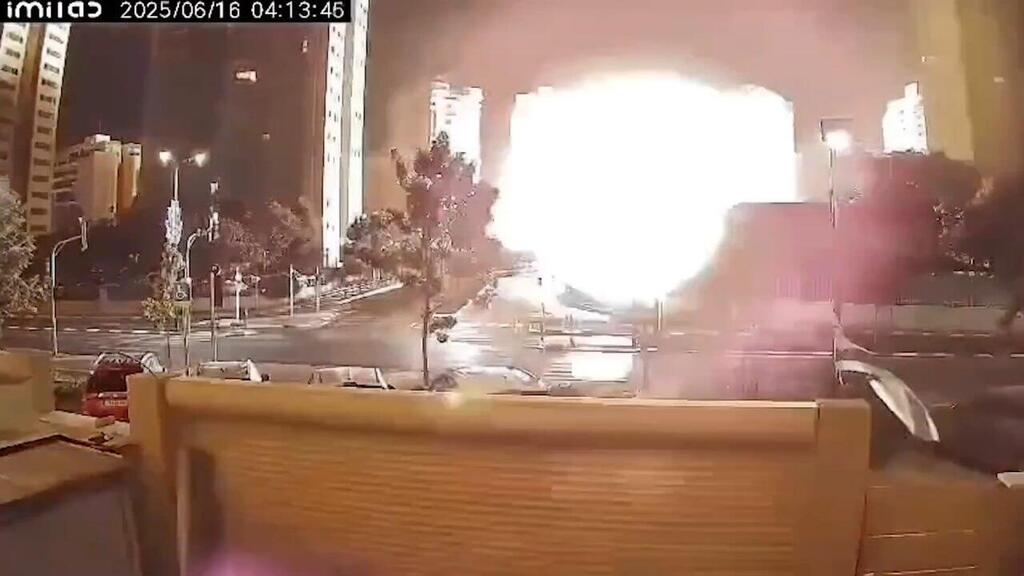The State of Israel wakes up again after another difficult night. At this stage, it is the civilians who are paying the price for both the war and its achievements. In light of the IDF’s impressive success in striking some of Iran’s missile batteries and stockpiles, the number of casualties was lower than the initial estimates presented to the cabinet.
However, these days and nights have deeply shaken Israelis' sense of personal security; anyone concerned about Israel’s standing and regional deterrence must remember: never before have such scenes of destruction been witnessed inside Israel itself. If the campaign ultimately concludes with an extraordinary achievement, as the opening strikes suggest, most Israelis will agree the price was justified. This is exactly the test now facing both the government and the defense establishment: balancing the human, economic, and societal cost against the war’s objectives.
There is no doubt that the Ayatollah regime crossed multiple lines in the past 48 hours. Among other targets, Iran deliberately struck civilian sites—locations not included in its original strike package (forgive my wording; I write under certain restrictions). Israel is now threatening Iranian energy facilities in response, and this is entirely understandable. But contrary to all the boasts — Tehran did not and is not burning, and the energy-related hits so far have been largely symbolic. On the contrary: part of the legitimacy Israel holds globally stems from its decision not to indiscriminately strike civilian areas.
Herein lies the problem: a severe strike against Iran’s oil infrastructure could trigger Iranian retaliation against Gulf energy targets, setting off a chain of events that could spike global oil prices — and potentially halt Israel’s campaign. Until now, the West and the United States have given Israel broad operational freedom. But surging inflation and gas station lines are a very different kind of crisis.
Israeli Air Force strikes western Tehran
And so we return to the core issue: how much has been done, and how much more can still be achieved against the nuclear and long-range missile programs — the war’s central objective. Nothing else. The political leadership must now ask the army how close it is to fully meeting the war’s defined objectives, what additional actions remain possible on the nuclear and missile fronts — and what cannot be achieved. Regarding American involvement: at this stage, everyone I’ve spoken to says that Trump is currently at “no” regarding joining (specifically with regard to Fordow). But with Trump's attention span being infamously short, this could change in an instant, and perhaps already has.
While Iran is under immense strain, the Islamic Republic has long been accustomed to such circumstances. Anyone hoping for regime collapse is welcome to their prediction — but it remains only that: a prediction. The Israeli defense establishment makes no claim of possessing a plan that would topple the regime. In fact, internal assessments conducted over the past two years suggest that a large-scale Israeli strike could actually unify parts of the Iranian public around the regime.
Get the Ynetnews app on your smartphone: Google Play: https://bit.ly/4eJ37pE | Apple App Store: https://bit.ly/3ZL7iNv
Why? Because Iran’s nuclear program enjoys broad domestic support — approximately 80% consensus. Yes, there are plenty of opposition videos. Yes, a strong third of the population, particularly in northern Tehran, despises the clerics. But there is a significant gap between that and the prospect of an actual revolution. IDF has tools to pressure the regime and create significant distress. But a true revolution requires broad public will — something extremely difficult to engineer, especially through a campaign of precision airstrikes.
Therefore, whether the regime falls (low likelihood) or survives (more likely), this cannot factor into operational planning. This war will not conclude with a press conference in Tehran where Ayatollah Khamenei apologizes for the nuclear program and signs an agreement recognizing the State of Israel.
Air Forces strikes at Iranian surface-to-surface ballistic missile launchers
(Video: IDF Spokesperson's Unit)
Regardless of whether the U.S. joins, the most likely scenario remains backchannel negotiations leading to a cessation of hostilities without any formal agreement. If the Iranians have been sufficiently hit, we will know within a few months, when they quietly crawl back to the negotiating table.
But a mutual cessation of all hostilities cannot occur until Israeli forces report to the cabinet that they have executed everything required of them, to the fullest of their capabilities. Since the government is — and always will be — rooted in populism, it is the responsibility of the defense establishment not to prolong this window unnecessarily; time that would allow Iran to regroup for a war of attrition, and inevitably kill more Israelis during long, painful nights.





